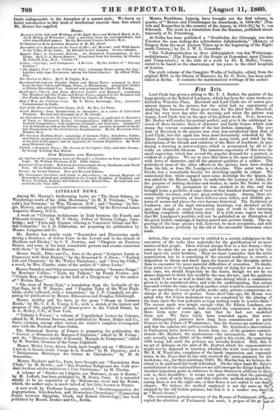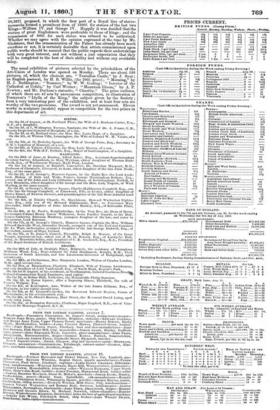Artists, like poets, must ever be entitled to a certain
indulgence in the execution of the tasks they undertake for the gratification of us more matter-of-fact people. Ideas will not always flow in a fine frenzy—they cannot be spun like so much yarn, and therefore we are not to be too hard upon our artist brethren. Then we must remember that the artist organization has in it something of the oriental tendency to reverie, a disposition to dream and dwell upon the fancies of the thoughts, rather than to encounter the more material difficulties of execution. No doubt, if an artist were to be bound by the necessity of doing his work in a cer- tain time, we should frequently be the losers, though we are by no , means disposed to think this would be the case always ; and the question is, would it not be as well to limit the time during which a commission given is to be considered alive, and with the understanding, that unless executed within the time specified,:another artist would be commissioned ? We are speaking of course of public works only, private commissions are always at the mercy of genius. Some short time ago, the House was asked why the Nelson monument was not completed bythe placing of the lions upon the four pedestals so long waiting ready to receive them ? The excuse made was simple enough—that Sir Edwin Landseer, our greatest modeller of animals, had accepted the commission to produce these lions some years ago, but that he had not modelled them yet. We have lately been reminded again, that seve- ral distinguished painters have long been commissioned to paint frescoes in the Palace of Westminster - that the frescoes are notdone yet, and that the salaries are paid nevertheless. Mr. Bentinck's observations in Parliament have, however, drawn from one of the painters commis- sioned—Mr. Herbert, the academician—the information, that he has only actually taken 25001. of the 6900/. paid to his credit, the remaining 3500 being left until the pictures are actually finished. Still, this is an act of delicacy on the part of Mr. Herbert which his representatives might not be disposed to sanction, whether the work were done or not. Mr. E. M. Ward also complains of the harsh imputation, and expressly states in the Times that he has only received the exact payment for his workdone, viz., for three paintings 1800/. Mr. Mediae has, we believe, de- clined to be paid until his work is finished. On the other hand Mr. Dyce's contributions to the national frescoes are still amongstthe things hoped for. Another important point in reference to these frescoes in addition to their
cost is, their durability ; it seems now quite certain that the painting; are in a state of early decay, and that either the method adopted in exeim,- outing them is not the right one, or that fresco is not suited to our dam=.:p climate. We believe the method employed is not the same as thi'it adopted by the old'Italian painters, but that it is a readier one, kno,--.A. as "Mezzo fresco." ar-
1
The ornamental portrait-statuary of the Houses of Parliament talc 0 oc- cupied the attention of Parliament last week, it propos of the gr ant of
39,5971. proposed, in which the first part of a Royal line of statue- monarchs formed a prominent item of 1600/, for statues of the last two Rings--William IV. and George IV. Happily it was decided that the statues of great Englishmen were preferable to those of kings ; and the commission of 8001. for each statue was refused to be authorized. Whether we may agree with the opinion expressed at the time by Mr. Gladstone, that the ornamentation of the Palace has already been much overdone or not, it is certainly desirable that artists commissioned upon public works should be assured that the public regards their undertakings with very great interest, and not without a just expectation that they will be completed to the beat of their ability and without any avoidable delay.



























 Previous page
Previous page